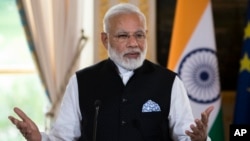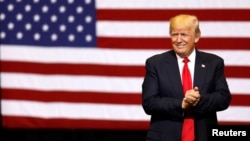Indian Prime Minister Narendra Modi heads to the United States for his first meeting with President Donald Trump amid anxiety in New Delhi about whether India will be able to build on the bilateral gains of the last three years.
Indian officials have expressed optimism Modi’s two-day visit starting Sunday will lay the groundwork for an expansion in ties.
“It is a very robust relationship, it is an expanding relationship,” said foreign ministry spokesman Gopal Baglay.
Discord before visit
But some discordant notes have emerged with Trump, who wants to restrict work visas used by many Indian professionals in the United States and who irked New Delhi by accusing it of making its participation in the Paris climate accord “contingent on receiving billions and billions and billions of dollars in foreign aid.”
“There are many mixed signals coming. Some things have made India very happy, some things have made India very uncomfortable,” said Harsh Pant, a fellow at the Observer Research Foundation in New Delhi. “For a long time the argument was that India’s rise is good for America. That argument no longer apparently holds, because this administration, this presidency is very transactional.”
Modi set aside decades of mistrust to cement closer ties with Washington, but analysts in New Delhi warn India may be low on Trump’s diplomatic priorities, of which he has made clear no relationship can be taken for granted.
With the U.S. president focused on foreign policy issues such as Russia and Syria, “India has indeed been left in the lurch,” according to Michael Kugelman, South Asia expert at the Washington-based Woodrow Wilson Center.
That is why Modi’s first meeting with Trump is being called a “testing of waters,” or a “get-to-know each other visit.”
Agreement likely on terrorism
The strongest convergence between the two leaders is expected to be on terrorism. Both leaders have a strong commitment to root out Islamic terror groups.
An expected announcement that the United States plans to supply 22 Guardian drones to India, a deal worth more than $2 billion, will also please New Delhi and be seen as a signal of Washington’s commitment to count India as a major defense partner and continue ties developed under the Obama administration.
But analysts say there is less clarity on how strongly the Trump administration will invest in a strategic partnership that deepened between the two countries in the last two years based on common perceptions about the need to balance China’s growing assertiveness in the region.
Indian foreign ministry spokesperson Baglay said, “One of the areas of focus is how to further push and develop economic cooperation for mutual benefit.”
Questions on trade
However there are questions whether Trump’s views on trade could jeopardize commitments made between the two world’s largest democracies for a five-fold jump in trade to $500 billion.
India is buying billions of dollars worth of arms from the United States, which is among the top weapons suppliers to New Delhi, the world’s biggest arms purchaser. But India has been pressing for technology transfers and local manufacturing that could run counter to Trump’s pledge to revive manufacturing in the U.S.
“Now when Donald Trump talks about ‘America First’ and Narendra Modi about ‘Make in India’ then there are people worried whether there is contradiction in these two policies or not,” said Chintamani Mahapatra, professor of international studies at the Center for Canadian, U.S. and Latin American Studies at New Delhi’s Jawaharlal Nehru University.
Officials say Modi will raise India’s concerns on the issue of the H1B visa program used heavily by technology companies to hire skilled Indian workers in the United States. Trump has ordered stricter enforcement and review of the program over concerns that it takes away American jobs.
But even though India’s information technology sector worries that the visa curbs could setback their huge business in the United States, Modi is not expected to press too hard on an issue that has bipartisan support in Washington.
Personal rapport
According to observers, the biggest takeaway from the talks could be just a good meeting between the two leaders.
“It is important that Mr. Modi develops a personal rapport, which might go some way in alleviating some concerns that some in India might have,” Harsh Pant said.
But few doubt the path ahead is less certain than with the Obama administration.
“Every country, friend or foe, partner or adversary is worried about the future of the relationship. So that is why even in India we do not know what is going to happen,” Mahapatra said. “That does not mean that we are really concerned that Indo-U.S. relationship is going to change so much that we don’t know how to handle it.”





